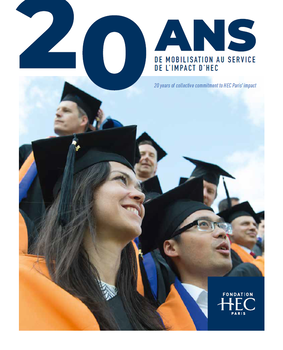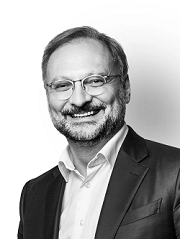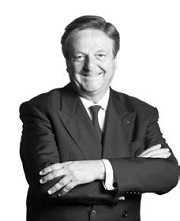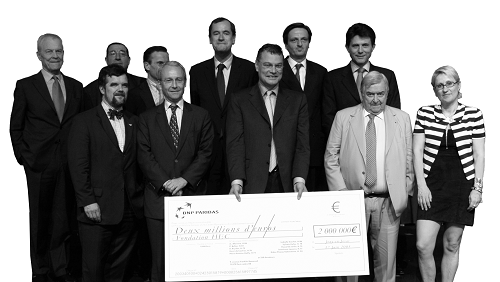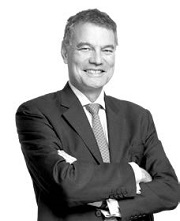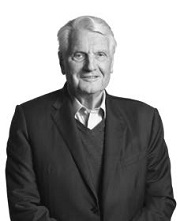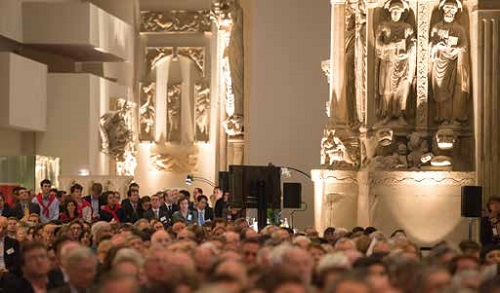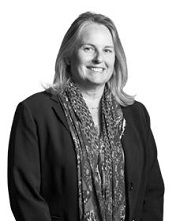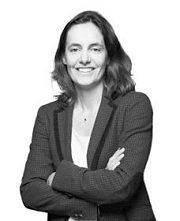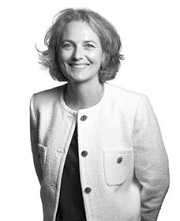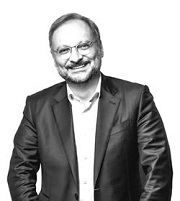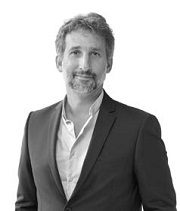20 Years of Philanthropy
20 years of collective commitment to HEC Paris's impact
Twenty years of philanthropy that transformed HEC
by Olivier Sevillia (MBA.90), President of the HEC Foundation
At the turn of the 21st century, the very idea of launching a major fundraising campaign for HEC seemed improbable.
Today, we have just completed a historic cycle: €213 million in donations and pledges, surpassing the €200 million goal of the latest campaign concluded in November 2024. An absolute record in French higher education.
Beyond the figures, it’s what the School achieves with these donations that should make us proud. Thanks to this generosity, HEC has undergone a profound transformation.
In twenty years, it has become more international, climbed the rankings, and established itself as a major player in entrepreneurship ; the Innovation & Entrepreneurship Institute was even ranked fourth by the Financial Times in Europe’s Leading Start-Up Hubs ranking in 2025! Most importantly, it has made spectacular progress in terms of equal opportunity.
I will never forget the day Behishta, the first young Afghan woman in the “HEC Imagine Fellows” program—whose brilliant studies were abruptly interrupted by the arrival of the Taliban—came to speak at HEC. We had funded her entire education and living expenses. Now a graduate, she plans to become a donor herself. Her journey embodies the power of our collective commitment.
Every transformed life is a powerful reminder of the difference our actions can make. These successes are the result of a chain of solidarity patiently built over more than two decades. To all my predecessors for the path they paved. To pioneers like Jean-Luc Allavena (H.86), who launched the movement. To key leaders like Daniel Bernard (H.69), whose commitment between 2008 and 2013 helped raise over €100 million. Through their testimonies, we invite you to measure the impact of our collective engagement. We also owe it to exceptional donors who are no longer with us: Philippe Foriel-Destezet (H.58), Pierre Bellon (H.54), and Didier Pineau-Valencienne (H.54), and to all the volunteers, alumni, friends, and School teams who gave their time, contacts, ideas, and financial support.
We have a beautiful new chapter to write together.
But before launching a new campaign—united with the School under the leadership of Jean-Paul Agon (H.78), Eloïc Peyrache, and the HEC Alumni Association, chaired by Hortense de Roux (H.05)—let us take the time to celebrate these twenty years of generosity.
Our mission is meaningful. HEC is a powerful vehicle for impact, and I dare say, one of the best philanthropic investments one can make today. Let’s continue to keep this chain of solidarity alive.
HEC deserves it, and society needs it.
The first chapter: 2005
By Jean-Luc Allavena (H.86), President of the HEC Foundation from 2003 to 2005
In the 1990s and early 2000s, several prominent HEC leaders gave decisive momentum to transform a prestigious French institution into an international group aligned with the needs of its time.
Among them, Didier Pineau-Valencienne (H.54), Paul Dini (H.60), Pierre Conso (H.53), Henri Lachmann (H.61), and a few others, including Claude Jouven (H.62) initiated a strategic development plan for HEC. This plan brought together nearly thirty corporate partners, strengthened cooperation with the Paris Chamber of Commerce and Industry, and led to the appointment of a Dean who would leave a lasting mark on the institution from 1995 to 2015: Bernard Ramanantsoa (MBA.76).
I joined forces with him in 2001, upon being elected President of the Alumni Association, to launch a unifying project for our community— supporting HEC, its leadership, faculty, and students. The context had shifted following a resolution by the Chamber of Commerce to grant HEC greater autonomy. It became clear that we needed to take our future into our own hands, particularly by securing the financial resources to do so.
We also needed to rally alumni to express their gratitude to the institution that had provided them with a world-class education and a springboard for their careers.
That’s how, in 2001, I came up with the idea of adapting the American university fundraising model to HEC — something that did not yet exist in France. I was convinced that this approach would bring not only capital, but also a deeper sense of purpose to our community.
The early days were challenging. Not everyone shared this vision— many were used to HEC being fully funded by the Chamber of Commerce and believed that asking alumni for financial support “would never work in France.”
But hard work, determination, and generosity soon overcame this skepticism.
After countless visits to graduating classes and alumni groups to raise awareness, we initiated a first collective mobilization in 2003, when I became President of the Foundation. Very quickly, the first donations came in, and within two years, we had nearly a thousand donors.
Some wanted to show major commitment, and we formed a founding group of ten major donors (see picture below) joined by Philippe Foriel-Destezet (H.58).
On June 17, 2005, during the graduation ceremony, they joined me on stage to present a symbolic check for two million euros—the first historic donation from HEC alumni to their school— in front of an audience of nearly 3,000 students, families, and faculty. Fundraising at HEC had officially begun.
The night before, we held the first-ever graduation-eve dinner in the Hall of Honor for the Class of 2005. I had proposed the idea to the Student Council, led by Michel Touati (H.05) with Jean Garandeau (H.05) and Marc Ramanantsoa (H.05), inspired by the “Class Gift” tradition of many international universities. One MBA student, Bernardo Bermudes (MBA.03), spontaneously supported the idea. Only students who had made a symbolic donation to the Foundation were invited — an act that clearly demonstrated their attachment and gratitude. My friend Pierre Bellon (H.54), founding President of Sodexo, graciously agreed to be the first sponsor of the event and generously offered the dinner.
Today, I am proud and happy to see how far this “baby” has come, thanks to all those who succeeded me in this mission — especially Daniel Bernard (H.69) and Olivier Sevillia (MBA.90), who, along with their teams, have done an outstanding job.
With Jean-Paul Agon (H.78) as Chairman of the Board and Eloïc Peyrache as Dean, a promising new era has begun. They can now count on more than 6,000 donors — and many more to come — to help build the future of HEC.
Bernard Ramanantsoa (MBA.76), Dean of HEC Paris from 1995 to 2005
The Foundation truly changed scale in 2005. That’s when the modern history of fundraising at HEC began.
Two key events marked this turning point. First, the emergence of our first group of Major Donors, captured in a memorable photo. This was the result of an initiative by Jean-Luc Allavena (H.86), my close partner throughout those years — first as President of the Alumni Association, then as President of the Foundation (Jean-Luc had been my student a few years earlier in a strategy course).
Second, the launch of the very first Class Gift, initiated by the Class of 2005, led by the BDE President Michel Touati, along with his classmates Jean Garandeau and Marc Ramanantsoa — my son.
These two pillars — Major Donors on one side, young graduates on the other — laid the foundation for a powerful chain of solidarity.
Even then, we knew that our ambitions could not be met if we remained dependent on public funding. The contribution from the Chamber of Commerce, already declining at the time, was bound to diminish. Yet we had a clear strategic ambition: to elevate HEC to the level of the world’s top business schools. And that required a strong focus on social inclusion and research.
The implementation and expansion of need-based scholarships over the years have been a major step forward in making HEC more accessible and diverse. But beyond the numbers, what stays with me are the faces—those of hundreds of students and alumni, past and present scholarship recipients, who said “thank you” with deep emotion.
Research was also a major focus.
At the time, it wasn’t obvious that a French business school like HEC should invest in research and recruit world-class faculty.
The Foundation’s support was crucial — not only financially, but also politically. Jean-Luc Allavena (H.86) from the start, followed by Jean-Marie Hennes (MBA.80) and of course Daniel Bernard (H.69), were key allies in this strategy.
Today, I’m proud to see that our faculty includes 140 research professors, two-thirds of whom are international. HEC has become a true research institution, highly ranked in Europe for its academic publications. I remain convinced that research is what gives an institution its academic legitimacy and long-term impact.
Fundraising also had a unifying effect. The School, the Foundation, and the HEC Alumni Association — three entities that sometimes moved at different paces — came together around a shared vision.
I am very confident in the future of the school, but we must keep planting seeds. Because it is the seeds sown twenty years ago that are now bearing fruit, thanks to the remarkable generosity of certain graduating classes. Thank you all!

2008 - 2013 tHECampaign
By Daniel Bernard (H.69), President of the HEC Foundation from 2008 to 2014
When I agreed to succeed Jean-Marie Hennes (MBA.80) as President of the HEC Foundation, at the request of Jean-Luc Allavena (H.86) and Mercedes Erra (H.81), I knew I was embarking on an ambitious adventure. We launched a fundraising campaign in the midst of a global financial crisis. Lehman Brothers had just gone bankrupt in October 2008. Raising 20 million euros in five years already seemed ambitious... aiming for 100 million seemed, to many, like madness. Yet, we did it.
We structured a true collective momentum around a cohesive and brilliant team led by Barbara de Colombe whose dynamism was crucial. We went beyond Paris to unite HEC alumni from afar.
For the first time, we mobilized international alumni by creating a trust in London and a 501(c)3 foundation in the United States. We also relied on the support of corporate partners, mobilized in the early 1990s by Didier Pineau-Valencienne (H.54).
The result: 112 million euros raised between 2008 and 2013.
Then 213 million in the next campaign. In France, this was unprecedented.
These funds allowed the school to enhance its academic excellence, develop research, entrepreneurship, the incubator... I am especially proud that we worked towards equal opportunities. We established free tuition for state scholarship recipients.
The scholarship rate increased from 5% in 2009 to nearly 20% in 2014! Previously, candidates from disadvantaged backgrounds didn’t even attempt the HEC entrance exam because they couldn’t afford the tuition. We turned the situation around. Now, they thought: ‘I must get into HEC, so my studies will be paid for.’ This changed the school’s image. I remember Yasmine, a 2015 graduate from Argenteuil, recounting how she studied on the kitchen table because she didn’t have a desk. That day, in the room, Pierre Bellon (H.54), a major donor to the school, had tears in his eyes. She embodied what we sought to build: a meritocratic and republican elite.
At that time, HEC was the first establishment to adopt the new status of EESC (Etablissement d’Enseignement Supérieur Consulaire), endowed with a shared governance between the Foundation and the Association. This was the culmination of a well-thought-out process. The current governance constitutes a balanced operating model. The relationship with the Chamber of Commerce remains fluid and constructive; we share a common vision for the school’s development. The transition occurred smoothly, through a handover between Bernard Ramanantsoa (MBA.76), Peter Todd (whom we recruited from Canada), and finally Eloïc Peyrache.
We must commend the Chamber of Commerce’s openness, which accepted this profound evolution in governance.
The HEC Foundation has become the leading university foundation in France, with a team of 20 people, and contributes to alumni engagement to support the school’s mission. I had set myself the goal that in the future, we would look back at this 112 million euro campaign and say we were playing “small ball”. And indeed, we have done even better since! Other challenges await us to finance the new campus and play in the big leagues. But anything is possible, as long as we work together.
Valérie Colloredo-Taittinger (H.94)
Major Donor and founder of the first sheltered Foundation, Board Member of the HEC Foundation and Member of the International Advisory Board of HEC Paris
HEC gave me a strong foundation — not just technical skills, but also self-confidence — which helped me find my way in a world full of brilliant people. Years later, I felt the desire to offer others that same foundation, that same starting point. That’s what led to the creation of "Fondation 104", born from this desire and a meeting with one of my classmates, Delphine Colson (H.94). It became the first sheltered foundation under the umbrella of the HEC Foundation.
I built this foundation with Bertrand Cardi (H.96), a friend I met at Gide. Working on this project together brought us even closer—it was a truly meaningful experience. Since then, we’ve tried to be there for scholarship students: a helping hand to find an internship or housing in Paris, or simply talking through career decisions. We’ve met students whose stories are both impressive and deeply moving, full of determination. It’s a real privilege to build connections with them.
Over the years, several mechanisms have helped fund the scholarships: a bequest from my mother’s estate, a temporary donation of usufruct from an apartment whose rental income funded scholarships, and targeted wealth tax donations to projects like HEC Imagine (for students from war-torn country) and Stand-Up (supporting women entrepreneurs in underprivileged suburbs). More donors have joined us to help expand our impact.
HEC isn’t just leading on the academic front anymore.
The School has become an effective platform for contributing collectively to a more inclusive world. That mission speaks to me deeply. In an increasingly fragmented world, the solidarity fostered through the HEC Foundation creates a chain of support — and that gives us the energy to keep moving forward.
Barbara de Colombe
Executive Director of the HEC Foundation from 2007 to 2017
In 2007, I was approached by Bertrand Léonard (H.85) and his young chief of staff, Pierre Bernardin (H.02). They were looking to professionalize fundraising at HEC, so they recruited us —Sandra Bouscal and me. Everything had to be built from the ground up: structuring the team, setting objectives, establishing the organization, projects and resources. We started as a team of three, raising €2 million annually. By the time I left in 2017, the team had grown to 12 people and raised €11 million a year.
What left the strongest impression on me was the collective momentum — a rare energy that carried us throughout this journey.
HEC was a pioneer in France, starting with the Class Gifts and initiating the momentum with the first major donors. At the time, we were still in the early stages, but we managed to rally support far beyond the Foundation team, with Daniel Bernard (H.69) and Bernard Ramanantsoa(MBA.76). Our initiatives for scholarship students convinced major donors like Pierre Bellon (H.54) and François Feuillet (H.70).
HEC is a world-class institution operating alongside giants with unmatched resources like Harvard with an endowment of over $50 billion! The HEC Foundation has grown significantly since then, a necessary development, as it now plays a key role in supporting the school’s mission.
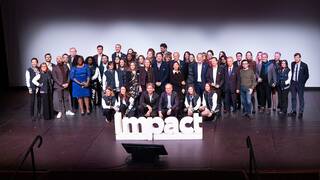
2019-2024 Impact tomorrow
This campaign has been a remarkable collective human adventure. When we arrived at the Foundation, HEC already had a clear ambition and major projects in the pipeline. Bertrand Léonard (H.85), President of the Foundation, and Peter Todd, Dean, not only laid solid groundwork, but also accomplished a key step in advancing the campaign. Individuals, companies, foundations, students, volunteers, and the teams from the School and HEC Alumni joined us in pursuing an unprecedented collective goal. Our ambassadors, particularly in France, the United Kingdom, and the United States played a key role in accelerating the mobilization of 6,000 alumni from all generations and programs. Individuals — alumni and friends of HEC—contributed 53% of the donations raised during this campaign, with over 40% coming from companies. For the first time, we also received donations from philanthropic foundations eager to support our commitments to equal opportunity, diversity, research, entrepreneurship, and innovation.
A total of €213 million was raised, and it is thanks to the commitment of everyone — early supporters and new donors alike—that we were able to exceed the ambitious goal we had set for ourselves! Together, we turned this major challenge into a historic success for HEC.
Beyond the numbers, the funds raised have had a profound impact on key areas of the School: they have helped uncover talent in France and around the world (over 5,000 students supported in 5 years), pushed the boundaries of knowledge through the research of our faculty made accessible to a wider audience, fostered the development of the most innovative teaching methods aligned with the major challenges of our time, accelerated the creation of tomorrow’s businesses, and supported innovation within today’s companies. These are just some of the projects created or expanded thanks to philanthropy, which we invite you to explore in our digital report (see above).
HEC Foundation has also established a capitalized fund — an endowment — inspired by American universities, whose returns provide long-term support for our initiatives.
We have thus reached a major milestone and laid the foundations for a sustainable, robust model that allows us to look confidently to the future.
But our mission doesn’t end here. Many challenges lie ahead, and we will need you — your support, your enthusiasm — to write the next chapter of HEC Paris.
Together, let’s continue this great adventure and amplify HEC’s impact.
Thank you all.
Serving the Common Good
Eloïc Peyrache, Dean of HEC Paris
At HEC, a non-profit academic institution, we are deeply convinced that we have a vital role to play in society. We can transform lives, multiply opportunities, and help shape the leaders of tomorrow.
But to do so, we must equip ourselves with the means to act.
It’s essential to understand that people don’t give to HEC — they give through HEC. Every donation benefits scholarship students, international students,committed researchers, and innovative entrepreneurs. The School is a true driver of transformation and a catalyst for impact. The growing support from donors outside our immediate community—especially major foundations—is a powerful testament to this. When individuals with no prior connection to HEC choose to support us, it’s because they see in us a strong lever for advancing the common good.
Take research, for example. Our goal isn’t to climb international rankings, but to bring more science and rigorous thinking into a world overwhelmed by misinformation. Our researchers tackle real-world challenges, such as algorithmic bias, ecological transition, governance issues, the future of family businesses, AI-enhanced mentoring, and new entrepreneurial models.
Their expertise is widely shared with society and aims to inspire both public and private decision-makers.
HEC is also a profoundly transformed community. Today, more than one in two students is not French. This diversity is no accident — it reflects our belief that major challenges of our time — climate, geopolitics, technology — require openness to the world and meaningful engagement with difference.
In this spirit, we created the HEC Imagine scholarships to welcome students from war-torn regions. Similarly, with the support of the Bettencourt Schueller Foundation and HEC’s strong expertise in entrepreneurship, we launched the Hopes program for social entrepreneurship.
These initiatives don’t just change individual lives — they also redefine the positioning of our institution and give it a unique soul. They are living proof that education and entrepreneurship are the most powerful drivers of social mobility. In a world searching for direction, we need science, commitment, and actionable solutions to major challenges — and institutions capable of guiding the decisions of today’s leaders. HEC has a vital role to play in this societal project.
For the past twenty years, thanks to the dedication of our community, we’ve been writing this remarkable story together. Thank you to all those who contribute with trust, energy, and passion.
Together with Jean-Paul Agon (H.78), Chairman of the HEC Paris Board, we hope to see more and more of you by our side, as we work to build the sustainable and shared prosperity that our school is so deeply committed to.
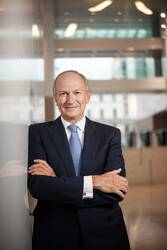
In just 20 years, HEC Paris has become a global leader in education and research, and I want to pay tribute to all those who made this transformation possible. In a world marked by uncertainty, we need institutions of excellence like HEC Paris more than ever, to guide decision making, shape enlightened leaders, and contribute to the common good. We are now entering a new era for HEC, thanks to an ambitious project, a new campus of the future, and I am counting on your enthusiastic commitment to write, together, the story of the next 50 years. HEC is counting on you!
Chairman of the HEC Paris Board
